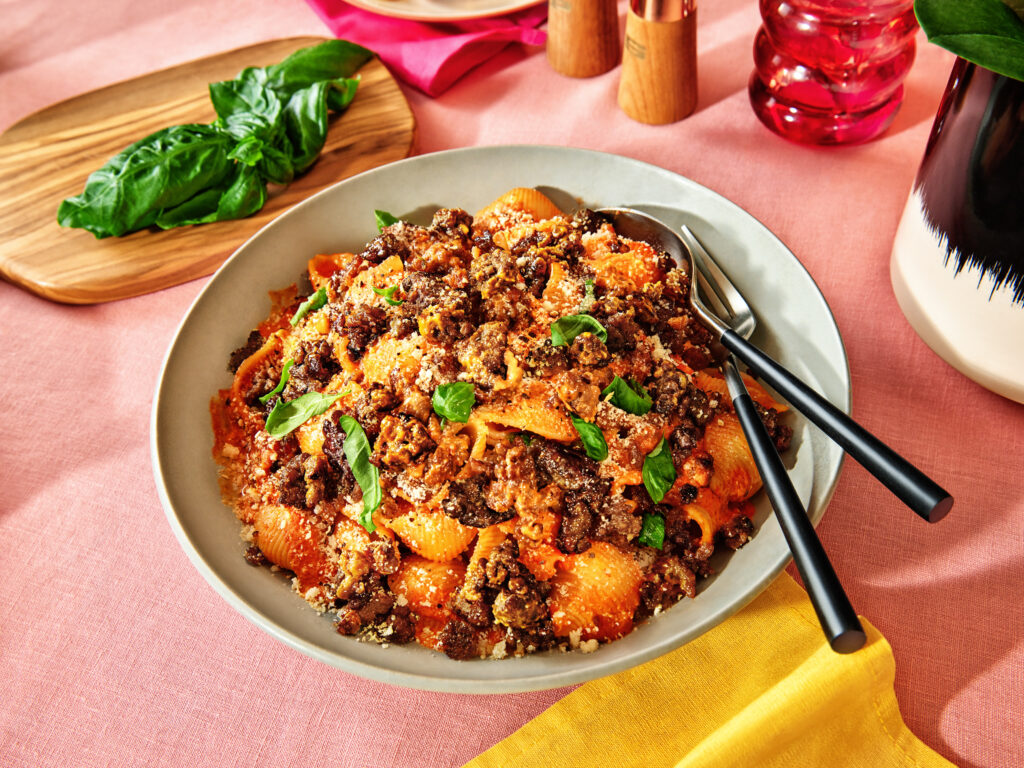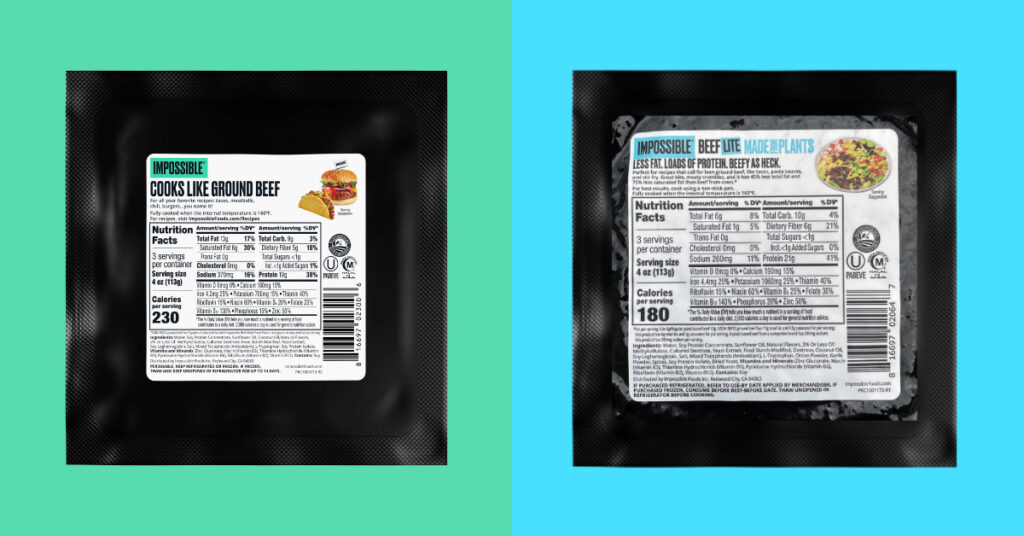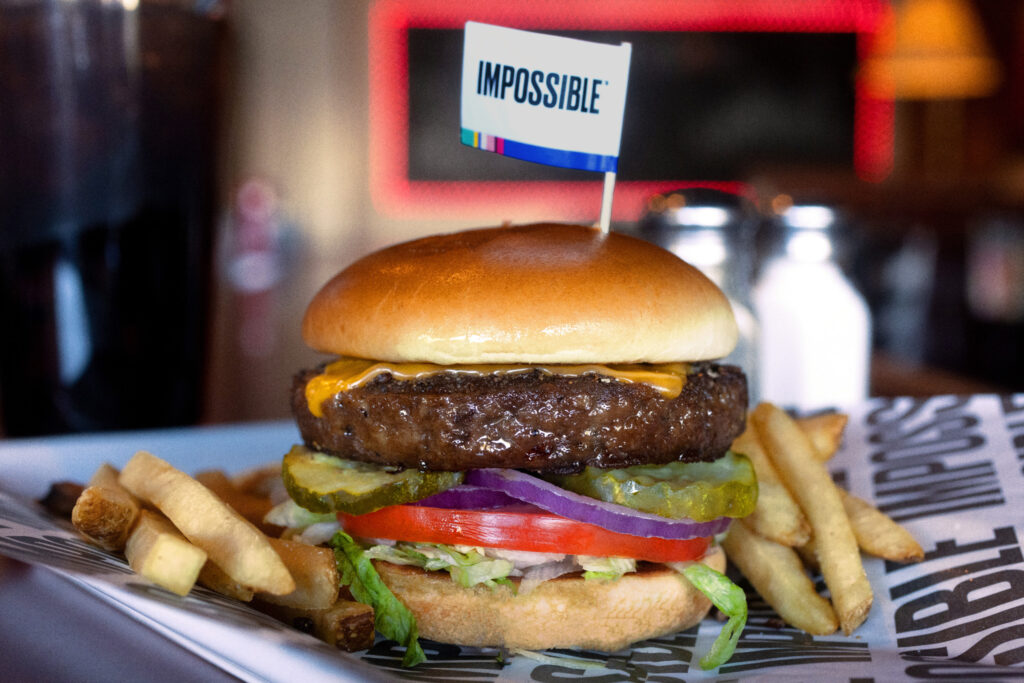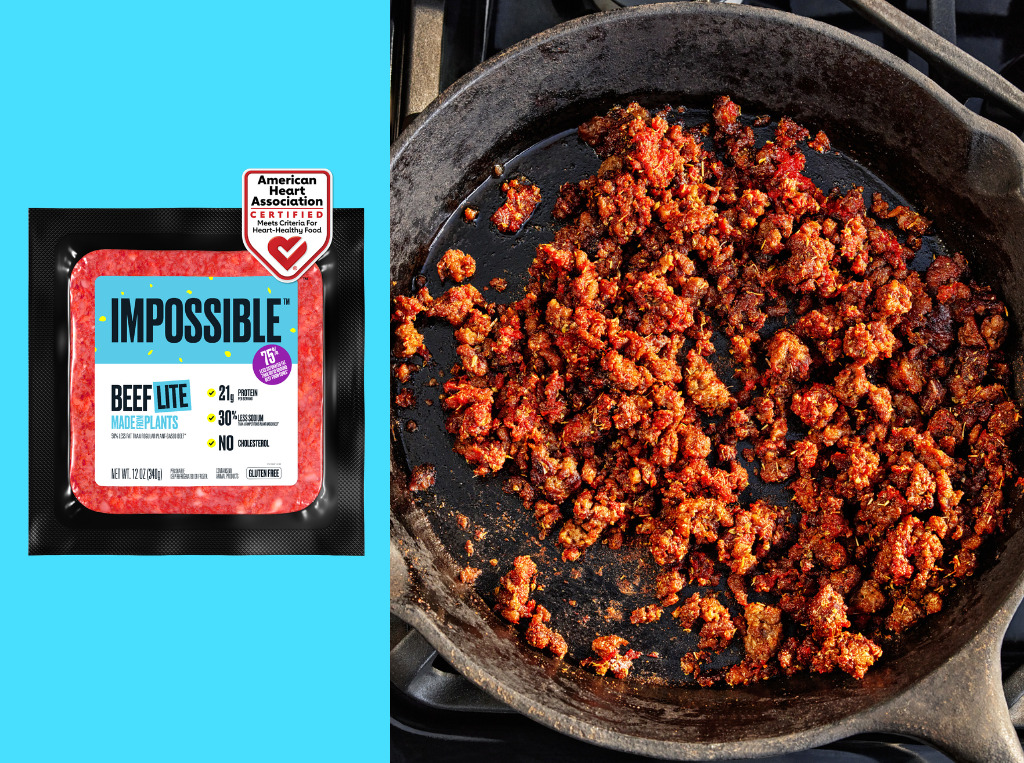‘Turning Sceptics into Believers’: Impossible Foods Receives Heart-Check Certification for its Lean Beef Lite
8 Mins Read
Impossible Foods has announced that its Beef Lite alternative has been certified by the American Heart Association’s (AHA) Heart-Check Food Certification Program, becoming just the second plant-based meat company to have an accredited heart-healthy product, weeks after adding Ruby Tuesday to its list of long-running F&B collaborations.
Impossible Foods’ Beef Lite – launched earlier this year – is now certified as a heart-healthy meat alternative by the AHA, a “major milestone” for the company in an era of misinformation and confusion surrounding plant-based meat.
With the certification, Impossible Foods becomes just the second alt-meat brand to be featured on the AHA list after fellow Californian plant-based meat giant Beyond Meat. The Beef Lite is the third product to be accredited with the Heart-Check mark, followed by the Beyond Steak and Crumbles range.
Impossible Foods’ Beef Lite caters to health-conscious Americans

“As more and more consumers are seeking to make choices that are better for themselves and for the environment, we need to make sure they understand the holistic benefits of meat from plants,” said Impossible Foods CEO Peter McGuinness. “The Heart-Check Mark is an important validator and we’ll wear it proudly.”
Impossible Foods’ Beef Lite, which is intended to be an alternative to 90/10 lean conventional beef, has 75% less saturated fat and 45% less total fat than the latter. Plus, it features 21g of protein per serving, low saturated fat content, and no trans fats or cholesterol.
This extends to the brand’s wider portfolio, all of which contain no trans fats or cholesterol and almost no added sugars. A majority of its beef, chicken, pork and sausage analogues contain 25% less total fat and saturated fat than their conventional counterparts, with many also boasting less than 20% of the daily recommended value of sodium per serving.
It speaks to the growing focus on health within the alt-meat category. A Food Marketing Institute study last year found that 50% of Americans believed plant-based meats were healthy in 2020, but that number dropped to 38% in 2022. Marketing campaigns like Beyond Meat’s This Changes Everything have sought to dispel misconceptions about these products.
Health is a regular topic in mainstream consciousness in the US, given the alarming rise in rates of obesity and type 2 diabetes – over two-thirds (69%) of Americans are overweight and 36% are obese. But the focus on heart health is even stronger, given that heart disease is the leading cause of death in the US – one American dies from cardiovascular disease every 33 seconds.
Meanwhile, earlier this year, research found that more American Gen Zers want to go vegan for their health than the environment. A 1,022-person survey by the International Food Information Council (IFIC) in May found that health is the major factor behind Americans eating vegan or vegetarian diets, with six in 10 choosing it. In terms of plant-based meat products like Impossible Foods, ‘healthy’ is the most appealing labelling description to these consumers.
Read between the clean labels
One major criticism of this sector is the often overly long ingredient lists, an aspect constantly attacked by meat lobby groups. One of these organisations, the Center for Consumer Freedom (CCF), which has run multiple ads targeting the plant-based meat industry, unveiled a commercial at the 2020 Super Bowl that featured Spelling Bee participants struggling with words like methylcellulose and propylene glycol (which it claimed were “chemicals” used for “synthetic meats”). “If you can’t spell it or pronounce it, maybe you shouldn’t be eating it,” the ad claimed.
In response, Impossible Foods parodied this with its own advert, where a child is confused after being asked to spell “poop”. The judge goes on to explain how there’s “lots of poop in the places where pigs and chickens are chopped to pieces to make meat”, with a voiceover citing research that found 300 samples of ground beef to contain “faecal bacteria”. In a nod to the CCF’s concluding line, Impossible’s ad states: “Just because a kid can spell ‘poop’, doesn’t mean you or your kids should be eating it.”
But cleaner labels still remain a major concern. ‘Natural’ is the second-most favourable labelling description of meat alternatives for Americans, according to the IFIC survey. This is a global trend: ingredients manufacturer Ingredion has found that 78% of consumers would spend more money on products with ‘natural’ or ‘all-natural’ packaging claims.
Impossible Foods’ Beef Lite has a larger ingredient list than the flagship beef alternative. Would that deter consumers? “Beef Lite is designed with ingredients to enhance the flavour for this application, including onion powder, garlic powder and spices,” an Impossible Foods spokesperson told Green Queen. “When evaluating a product for health, what matters most is the quality and nutritional value. The reality is that Beef Lite is a healthy and nutritious option.”
The representative compares this to the health perceptions of cereals, pointing to how whole-grain Cheerios meet the FDA’s health guidelines and are accepted as a healthy breakfast option despite having over 15 ingredients (although about 10 of those are vitamin and mineral fortifications).
Besides, Impossible Foods says the less fatty flavour profile of the leaner Beef Lite means it pairs well with dishes like chillies, tacos and pasta, and has been received positively by consumers. The company cites one review to illustrate this point: “I was excited to have a lighter option to the original to help support my health goals. I’ve used this to make a few different dishes and they’ve all turned out great. I didn’t miss the additional fat from the original at all.”
Health or taste? Impossible says both

The alt-meat maker isn’t just banking on the health aspects of its newly certified product: taste is still paramount. A recent Mintel survey showed that nutrition is actually the second-biggest reason (35%) for Americans’ reticence to try alt-meat, after flavour (48%).
Impossible Foods’ spokesperson agrees: “Taste is the #1 reason why consumers will decide to purchase a product again or not. Many consumers have unfortunately had a less-than-positive first impression of various plant-based products, and that casts doubt on the rest of the category as a whole.”
But then, how would people respond to products marketed as ‘lite’? “We have other products in our lineup for consumers who are looking for a truly gourmet, decadent experience,” they note, pointing to the new Indulgent Burger designed “to be juicier, meatier and all-around more ‘indulgent’”.
“That said, some health-conscious consumers tend to prioritise nutrition over taste, which is why we created a product like Beef Lite,” the representative explained. Having products on both ends of the spectrum adds differentiation to its portfolio and suits a variety of consumer needs – from taste and nutrition to everyday cooking. “This allows us to better meet consumers where they are and make meat from plants feel more accessible.”
The company claims that consumers “consistently prefer” its products over competitors’ offerings. It cites multiple blind taste tests to validate this. In Chicago, 91% of the 100 meat-eating participants chose the Impossible Sausage over another leading vegan counterpart, and 71% of 105 consumers in another trial favoured its meatballs. Meanwhile, 80% of 206 Atlantans preferred its chicken nuggets and 63% of 105 people in Denver picked its beef over competitor products.
Impossible Foods’ taste tests have also extended to animal-derived meat. In a 205-participant test in Chicago, 82% of consumers said the indulgent Burger tasted as good as or better than cow-based beef. Two-thirds of 136 Americans surveyed said the same about the Impossible Sausage in a home usage trial. Meanwhile, seven in 10 Americans preferred the brand’s foodservice chicken nuggets over conventional ones, with the product scoring higher in every category, including flavour, texture and overall appearance.
There’s a clear precedent for consumers liking the company’s meat analogues. Asked if Impossible Foods planned to hone in on health in future marketing campaigns – à la Beyond Meat – the spokesperson kept details under wraps, but offered: “Marketing continues to be a focus for us as we work to bring more meat eaters into the category.”
Americans can buy Beef Lite in grocery stores nationwide, but so far, that seems to be the limit of the product’s footprint for now, with no plans to bring the product to international markets as of yet.
Building on foodservice sector in a volatile sector

The heart-healthy certification comes just a week after Impossible added Ruby Tuesday to its foodservice roster. It will be the largest US chain to carry Impossible Foods’ gourmet Indulgent Burger, which will appear on the menu at all 214 Ruby Tuesday locations nationwide.
It extends the plant-based giant’s exemplary record of foodservice partnerships. Impossible Foods has long-running collaborations with American chef David Chang (seven years), hamburger chain White Castle (five years), Burger King, Starbucks (four years each) and Disney (three years).
It’s a great streak, and the company will hope to have similar success with Ruby Tuesday. Until December 26, diners can get the Impossible Indulgent Burger with a side of tater tots or fries for $6.99 as part of the restaurant’s Tuesday Daily Deal – marking an affordable way to get your hands on a premium plant-based meat product.
The category itself has been in turmoil recently, hit hard by a combination of Covid-19 after-effects, supply chain disruptions, the cost-of-living crisis, and low investor confidence. According to insights firm Circana, retail sales of meat alternatives declined by 12.6% to $106.8M in the five weeks to July 2, 2023, with units down by 19.8% year-on-year. And for the year to July 2, 2023, sales declined by 7.3% year-on-year, while units saw a 15.6% fall.
It has meant that some companies have folded, while others have suffered revenue losses. Just this week, Beyond Meat announced a 26.5% decline in quarterly sales in Q3, following a 30% year-on-year fall last quarter. There have been a bunch of layoffs too, including at mycelium meat maker Meati, and multiple times at both Beyond Meat and Impossible Foods itself, which laid off 20% of its workforce (132 employees) in February, after a 6% cut last October.
But McGuinness told AFN in September that the company’s retail performance is strong: “In the 52-week Nielsen [data], we’re still growing high single-digit, low double-digit in retail, which is great. We have a 50% repeat [purchase rate]… so every two people we get to try our product, one repeats, which is quite strong.”
“Impossible is doing its part to introduce meat from plants that rivals the animal and as a result, we’re responsible for driving a majority of the category’s growth,” the company’s spokesperson told Green Queen. “However, we need to increase the availability of products that taste as good or better than their animal counterparts across the category. Doing so will increase the probability that a consumer will have a positive experience and turn a sceptic into a believer.”



